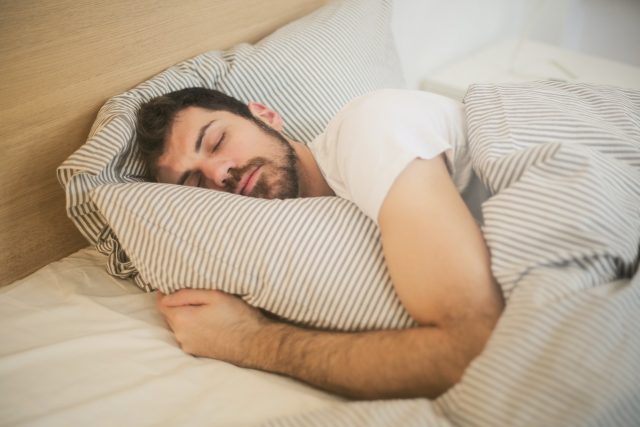Do you often feel tired and drained? Do you have trouble sleeping through the night? If so, you’re not alone. Millions of people around the world suffer from sleep disorders that prevent them from getting a good night’s sleep. In this blog post, we will discuss some tips on how to improve your quality of sleep and get the most out of your slumber!
Make Sure You Have The Right Pillow
One of the most important things to ensure a good night’s sleep is to have the right pillow. If you often find yourself waking up with a stiff neck or headaches, it may be time to invest in a supportive pillow that is comfortable. Pillows should support your head and neck while keeping your spine in alignment. If you sleep on your side, look for a pillow that is thick and firm. If you sleep on your back, look for a pillow that is thin and soft. Try out various pillow types until you find one that meets your needs.
Don’t Eat or Drink Too Much before Bedtime
Another tip to improve your sleep quality is to avoid eating or drinking too much before bedtime. Eating a big meal can cause indigestion, which can make it difficult to fall asleep. Drinking alcohol or caffeinated beverages before bed can also disrupt your sleep. If you need a nightcap to help you relax, try drinking herbal tea instead of alcohol. And if you absolutely need caffeine, drink it early in the day so that it doesn’t interfere with your sleep at night.
Get Some Exercise
Exercise is beneficial for your overall health as well as for improving your quality of sleep at night. A moderate amount of exercise can help to tire you out and make it easier to fall asleep. But avoid working out too close to bedtime, as this can actually have the opposite effect and make it harder to sleep.
Some exercises to do during the day to improve your sleep at night include:
- Jogging in the morning or the afternoon
- Going for a light jog or run
- Riding a bike
- Doing some yoga or stretching exercises
- Lifting weights at the gym.
Consistency is key when it comes to exercise and sleep, so aim to get at least 30 minutes of moderate exercise most days of the week. And if you can’t fit in a full workout, even just a few minutes of deep breathing or taking a short walk can help to improve your sleep.
Stick To A Sleeping Schedule
It can be hard to keep a regular sleep schedule when you have a lot on your plate. But, if you can stick as closely as possible to a set bedtime and wake-up time, your body will thank you. Try not to break from your sleep schedule more than an hour or two on either end, if at all possible.
Create a comfortable sleeping environment. This calls for a room that is quiet, cool, and dark. Make your room as dark as you can by using blackout curtains or an eye mask. And if outside noise is an issue, try using earplugs or a white noise machine. As for temperature, most people sleep best in a cool room (between 60 and 67 degrees Fahrenheit).
Find The Right Mattress
If you’re not sleeping well, it’s time to find the right mattress. A quality mattress will provide the support and comfort you need to get a good night’s sleep. Make sure to lie down on a mattress in the store when looking for one to get a sense of how it feels.
Pay attention to your body and how it responds to the mattress. If you have any pain, it’s probably not the right mattress for you. There are a variety of mattresses on the market, so take your time to find the one that’s best for you.
Increase Bright Light Exposure
If you’re looking for ways to improve your quality of sleep, one thing you can do is increase your exposure to bright light. Bright light exposure during the day can help regulate your body’s natural sleep-wake cycle and make it easier to fall asleep at night. You can get bright light exposure by spending time outdoors in natural sunlight or by using a light therapy box.
You should aim for at least 30 minutes of bright light exposure every day, though more may be needed depending on the severity of your sleep problems. If you have trouble sleeping, try exposing yourself to bright light first thing in the morning and throughout the day to help reset your body’s sleep-wake cycle.
Reduce Blue Light In The Evening
If you’re looking to significantly improve your quality of sleep, one of the best things you can do is reduce your exposure to blue light in the evening. Blue light comes from screens like our phones, computers, and TVs, and it can disrupt our natural sleep patterns.
To reduce your exposure to blue light in the evening, try to avoid screens for at least an hour before you go to bed. If you can’t avoid screens, there are a few things you can do to minimize the impact of blue light on your sleep. One is to wear blue-light blocking glasses, which filter out the blue light from screens and make it easier for your brain to wind down before bed.
Another is to download a blue light filter for your phone or computer, which will reduce the amount of blue light that comes from your screens. If you can reduce your exposure to blue light in the evening, you’ll be on your way to getting better quality sleep!
There are a few key things you can do to significantly improve your quality of sleep. First, exercise regularly and stick to a consistent sleep schedule. Second, create a comfortable sleeping environment that is dark, quiet, and cool. And third, reduce your exposure to blue light in the evening by avoiding screens for at least an hour before bed. By following these tips, you’ll be on your way to getting better quality sleep!














